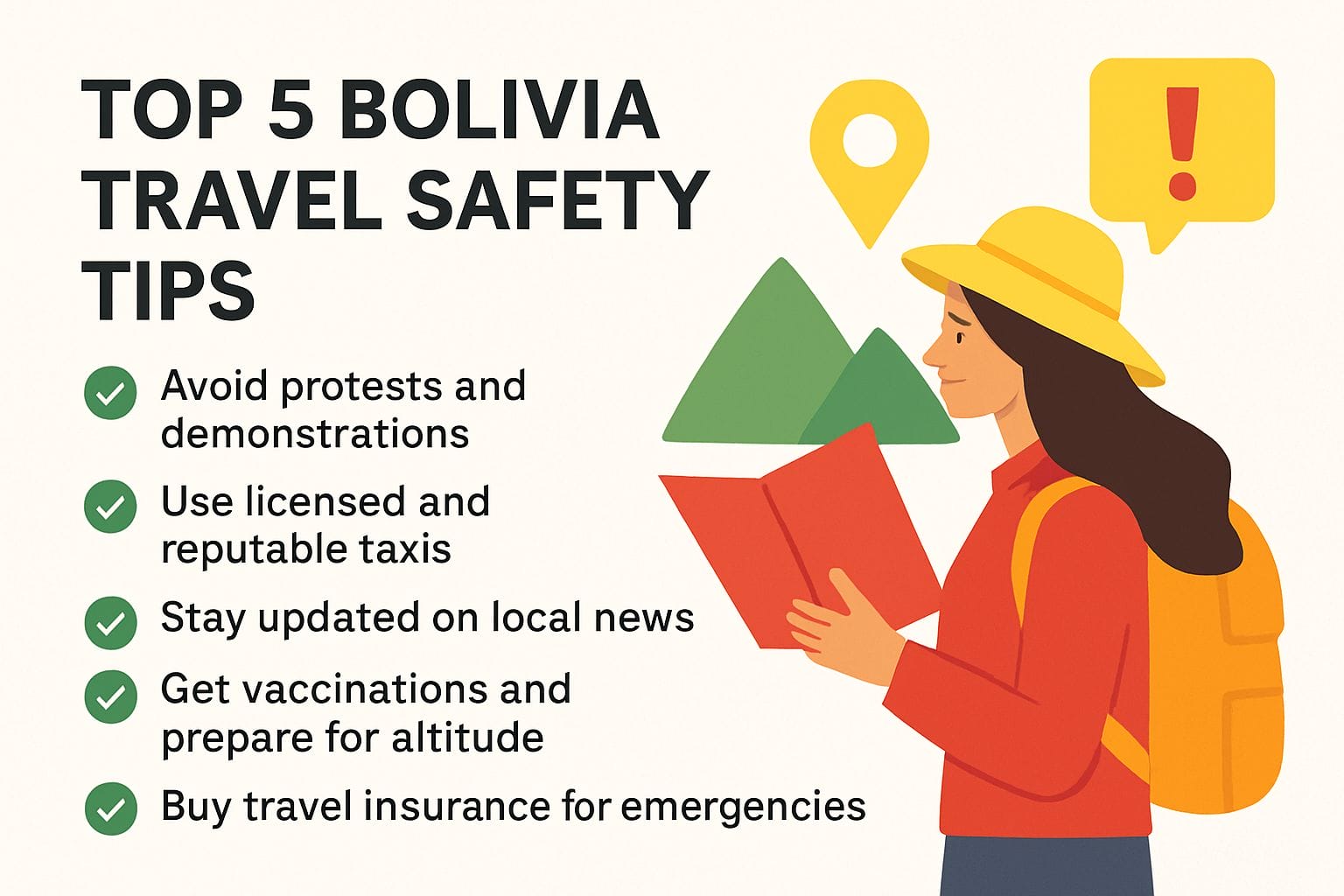International Travel Advisories Heighten Concerns for Bolivia
Bolivia’s tourism industry is facing fresh challenges as multiple governments warn travelers of heightened safety risks. Canada has joined the United Kingdom, Germany, Italy, and Australia in issuing new travel advisories that urge visitors to exercise a high degree of caution. These advisories emphasize threats related to crime, political unrest, and transportation disruptions that may affect both domestic and international visitors.
With Bolivia’s unique landscapes — from the high-altitude city of La Paz to the salt flats of Uyuni — the country remains a popular destination. However, the latest advisories highlight the need for travelers to prepare carefully before embarking on their journeys.
Canada’s Advisory: Political Unrest and Crime Risks
The Canadian government has placed Bolivia under a “high degree of caution” status due to frequent protests, sudden roadblocks, and political instability. These disruptions are particularly common in regions such as Cochabamba and Santa Cruz, where demonstrations can escalate quickly.
Canadian officials also warn of increased petty crime in public places, airports, and bus terminals. Express kidnappings, where victims are forced to withdraw money from ATMs, remain a documented risk. Travelers are advised to use only registered taxis and avoid carrying valuables in crowded areas.
Health precautions also feature prominently in Canada’s advisory. Vaccination against yellow fever is strongly recommended for travelers visiting regions such as Chuquisaca and Santa Cruz. Given Bolivia’s varied healthcare infrastructure, Canadians are urged to secure comprehensive travel insurance and prepare for potential altitude sickness in highland destinations.
Germany’s Advisory: Social Tensions and Health Concerns
Germany’s advisory highlights Bolivia’s recurring political and social unrest, with roadblocks and strikes often restricting movement to airports and tourist sites. Travelers are advised to avoid demonstrations, which have historically turned violent.
Crime remains a concern, particularly in La Paz, Santa Cruz, and the Chapare region, which is also linked to drug trafficking. German authorities recommend avoiding unlicensed taxis and securing belongings at all times.
For health, Germany underlines the importance of yellow fever vaccination, particularly in La Paz and Cochabamba. Visitors should also prepare for altitude sickness, as Bolivia’s capital is one of the world’s highest cities, sitting at over 3,600 meters above sea level.
Australia’s Advisory: Heightened Crime Warnings
Australia warns that violent crime and civil unrest are growing challenges in Bolivia. Demonstrations in La Paz, Santa Cruz, and Cochabamba often bring travel to a standstill, with roadblocks disrupting access to airports.
Australians are cautioned against using street taxis, as reports of robberies and express kidnappings persist. Petty theft in tourist hotspots such as markets, bus stations, and popular landmarks is common.
On health matters, the Australian government emphasizes the importance of receiving a yellow fever vaccination before traveling to certain regions. It also reminds travelers to carry updated medical documentation and prepare for altitude-related health issues.
Italy’s Advisory: Risks During Election Season
Italy has issued a strong advisory in anticipation of Bolivia’s presidential elections on October 19, 2025. The advisory notes that political campaigns and protests are expected to intensify, leading to strikes and blockades that could disrupt transport to major airports and cities.
Italian authorities also caution travelers about violent crime, including armed robbery and food or drink spiking incidents in La Paz and Santa Cruz. Express kidnappings remain a risk, further reinforcing the recommendation to use only registered transport services.
Health measures include mandatory yellow fever vaccination for certain regions and preparation for altitude sickness in highland cities. Italy strongly advises travelers to monitor local news and follow guidance from Bolivian authorities during their stay.
UK’s Advisory: Crime and Health Warnings
The United Kingdom has echoed similar concerns, urging British nationals to remain vigilant in Bolivia. Protests in La Paz and Santa Cruz have been known to escalate into violent clashes, making it essential for travelers to avoid large gatherings.
Crime advisories include warnings about theft in crowded areas, armed robberies, and drug-related incidents. The UK highlights cases of drink spiking in nightlife areas, urging travelers to remain cautious in bars and nightclubs.
In addition to yellow fever vaccination, British officials recommend preventive measures against mosquito-borne diseases such as dengue and malaria, particularly in lowland regions. The risk of altitude sickness is also emphasized for those visiting La Paz, Potosí, or Uyuni.
What This Means for Travelers
The collective advisories from Canada, the UK, Germany, Italy, and Australia paint a clear picture: while Bolivia offers remarkable cultural and natural attractions, it also poses significant safety challenges. Tourists planning to visit should:
- Avoid protests and large gatherings.
- Use only registered and reputable transportation services.
- Stay updated on local news and developments.
- Secure comprehensive travel and health insurance.
- Take medical precautions, including vaccinations and preparation for altitude sickness.
Conclusion
Bolivia remains a destination of unparalleled natural beauty and cultural richness, from the Amazon rainforest to the Andes mountains. However, the latest advisories from Canada, Australia, Italy, Germany, and the UK highlight the need for travelers to prioritize safety and health precautions.
By staying informed, exercising vigilance, and planning ahead, tourists can still enjoy Bolivia’s breathtaking experiences while minimizing risks. As the political climate evolves and social unrest continues, governments worldwide stress the importance of approaching Bolivia with heightened awareness and caution.
For more travel news like this, keep reading Global Travel Wire


















